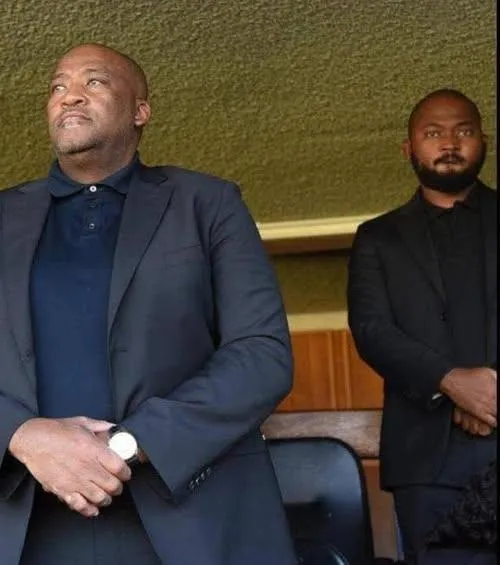The alarming decline of PSL ownership standards as Siwelele FC battles turbulent times

Sport Minister Gayton McKenzie and his son, Calvin Le John, who has purchased Siwelele FC for R50 million from PSL outfit Supersport United.
Image: Facebook
In the upper echelons of South African football, a troubling reality is emerging - the political manoeuvring surrounding the Premier Soccer League (PSL) is beginning to overshadow the essence of the game itself.
Recent performances from Siwelele, a new club in the top flight, have been disheartening, as they have suffered their sixth defeat in eight matches without scoring a single goal in their last seven games.
Yet, it’s the escalating off-field crises that present an even more pressing issue.
At the centre of this turmoil is the club’s chairman, Calvin Le John, whose lineage ties him to Sports Minister Gayton McKenzie. Le John has stoked controversy with his recent remarks regarding the club’s management and trajectory.
In a video announcement, Le John declared that Siwelele has severed ties with CEO Stan Matthews and assistant coach Andre Arendse, citing alleged threats to their safety. This alarming revelation suggests a more sinister atmosphere surrounding the club, prompting questions about the pressures faced by those in leadership positions.
Le John further inflated concerns with his intention to unilaterally terminate contracts of players he perceives as lacking commitment. “Players who lack heart and commitment to this team will be released,” he stated, indicating a management approach that appears more reactive than strategic.
These developments raise critical questions about the ownership standards in the PSL. Political influences looming over club decisions can have detrimental effects on the sport. When political ties become entangled with football management, it risks undermining the integrity and competitive spirit of the game.
As Siwelele navigates this precarious situation, one must ask: what constitutes effective leadership in the present-day PSL? Is it determined by hasty decisions made under duress, or should it be grounded in fostering development and stability?
While definitive answers may remain elusive, emerging trends are evident. If these declining standards go unaddressed, the essence of South African football faces serious jeopardy, hanging by a thread.
Siwelele’s struggles mirror a larger issue within South African football. How can we expect to see improvement when those at the helm appear more focused on threats and scapegoating than on creating a unified team on the field?
The future of the PSL is precarious, and if these recent developments are any indication, it’s clear that an evaluation of ownership standards is urgently needed.
The South African Football Players’ Union (SAFPU) has stepped in to support the staff at Siwelele, expressing concern over the club’s unsustainable financial practices. In its statement, SAFPU highlighted that the club’s issues indicate a serious lapse in financial due diligence during the acquisition process.
These developments cast a shadow over the PSL, the governing body of professional soccer in South Africa.
Irvin Khoza, the PSL chairman, last confronted ownership issues amid the tumultuous situation with Royal AM, which notably refused to participate in scheduled matches and the promotion/relegation play-offs. In a moment of frustration, Khoza famously remarked, “We have to go out there into the open market where there’s a willing buyer and a willing seller.”
This statement rings with desperation and aligns with SAFPU’s assertions about the club’s financial mismanagement. Khoza also insisted, “I will not let anyone – anyone – mess it (the PSL) up.” Yet, if the PSL continues to overlook due diligence, it risks undermining its own credibility. In the last decade, nearly every season has seen clubs changing hands, raising serious questions about stability.
As the Premier Soccer League strives to embody the spirit of South African football, troubling trends regarding ownership and management have surfaced. The unsettling news emanating from Siwelele extends beyond the field, revealing alarming details about its internal operations.
This significant alteration in management not only raises questions but also highlights a lack of accountability and professionalism that every reputable club in the PSL should maintain.
Football often mirrors society, reflecting deeper societal issues; Siwelele’s circumstances may serve as a wake-up call for the league’s leadership. In these challenging times, it seems that not only are player performance standards dwindling, but the expectations and conduct at the management level are also deteriorating significantly.
Related Topics: